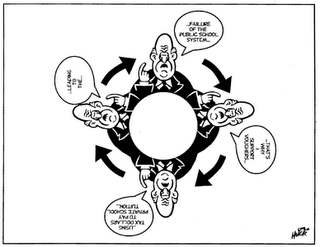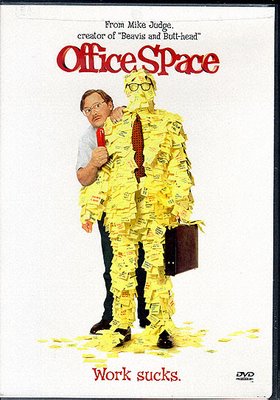Dennis has a lovely post discussing
the myth that God has abandoned the public schools over at his place. It is beautifully written. I hope you go over and read it; it is really well-crafted and obviously comes straight from the heart. Here's the intro: Dennis was sent one of those chain emails:
Billy Graham's daughter was being interviewed on the Early Show and Jane Clayson asked her "How could God let something like this happen?" And Anne Graham gave an extremely profound and insightful response. She said "I believe that God is deeply saddened by this, just as we are, but for years we've been telling God to get out of our schools, to get out of our government and to get out of our lives. And being the gentleman that He is, I believe that He has calmly backed out. How can we expect God to give us His blessing and His protection if we demand that He leave us alone?"
MY REPLY
I want to make it clear that this is not meant as a criticism of anyone for sending along this e-mail message. I have no doubt that anyone doing so had the best of intentions. I'm responding because it contains a message that infuriates me when I hear it, and I've been hearing it for a number of years, now. That is the message that we do not allow God in public schools.
Then he starts a lovely rumination:
But even if we don't have school prayers, that doesn't mean we don't allow God in school. Maybe I'm spiritually confused, but I see God more in the way people go about their everyday affairs than in whether or not they are comfortable with public prayer. When teachers go out of their way to help students, isn't God in our school? When some kid who "gets it" tries to help some kid who doesn't "get it," isn't God in our school?
There's plenty more there, and it's wonderful.
My sixth grade teacher apparently had never heard of the Supreme Court, and every day we all took turns starting the class off with a prayer. In my junior high, many kids who went to a certain church liked to carry their Bibles with them to class every day. I don't think they ever opened them in school, but there they were, sitting on the desks in every class. You know, a nice necklace or brooch or tietack, or even, had they followed a different denomination, a big, honkin' crucifix would have been just as effective a statement, and certainly would have been lighter, but they never asked me-- although they did ask me where MY Bible was, and I think I said something snarky about not needing to carry it because I had the lessons INSIDE the Bible stored in my brain. (Once a smart-ass, always a smart-ass.)
But anyway, back to the point of Ms. Graham.
As someone who was forced to participate in "sword drills" (that could be a whole post to explain, in and of itself) and mass memorization of scripture as my mother wandered among 8 different fundamentalist or charismatic denominations before I was 14, I would say that Ms. Graham and others of her ilk apparently don't know their scripture too well and I say this with gentleness, not meanness. (Yes, I am that most strange creature- an Episcopalian who is familiar with the Bible. Insert joke here. Go ahead-- I can take it.)
Has God abandoned our schools, our government, our country because we do not publicly insert our worship of God into the business of the day?
If God didn't abandon David even when he was mired in murder and adultery, then I don't think God would abandon the public schools (See II Samuel, chapter 11).
If God didn't desert Saul all the way until his conversion on the road to Damascus, then I don't think God would abandon the public schools (see Acts of the Apostles, chapter 9).
Further, if God did not abandon
John Newton as he willingly kidnapped thousands of people from their homes and sold them into slavery, then I don't think God would abandon the public schools. As Newton later wrote: "Amazing Grace, how sweet the sound that saved a wretch like me!"
If God does not abandon the most inveterate, unreformed murderer on death row, who converts as the balance of his or her life hangs heavy upon his or her vicious heart (I'm thinking of
Karla Faye Tucker in particular), then I don't think God would abandon public schools.
Throughout the Holy Scripture that many people claim that they follow by every comma, dash, and apostrophe, the message is that people despair, but God remains steadfast.
People who claim that God has abandoned public schools (and our government and our country) are decrying the fact that public schools do not allow public prayer and worship within the course of the school day.
But what does the sixth chapter of Matthew
say (verses 5 through 8)? "When you pray, you shall not be as the hypocrites, for they love to stand and pray in the synagogues and in the corners of the streets, that they may be seen by men. Most certainly, I tell you, they have received their reward. But you, when you pray, enter into your inner chamber, and having shut your door, pray to your Father who is in secret, and your Father who sees in secret will reward you openly. In praying, don't use vain repetitions, as the Gentiles do; for they think that they will be heard for their much speaking. Therefore don't be like them, for your Father knows what things you need, before you ask him."
And to paraphrase that story about the
footprints in the sand, non-scriptural as it is, when people complain that God has abandoned them, it is because they have closed their hearts to the presence of God; when we don't hear God answering us (and sometimes, by the way, silence IS an answer) God is being quiet, listening because there we are, yammering away, talking so much that we don't hear anything.
My students don't have to know my personal religious beliefs for me to feel that I am answering the sacred calling that resonates within me to be a teacher. After all, education and religion are both about redemption.
 ANIMAL HOUSE!
ANIMAL HOUSE!





























